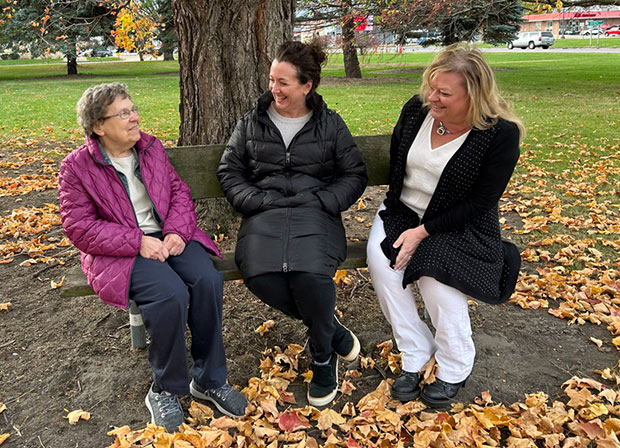
Sister Jan Cebula, OSF, Shannon Sander-Welzien and Regan Michaelsen sit at the proposed site of a supportive housing project in Clinton.
By Barb Arland-Fye
The Catholic Messenger
CLINTON — When a proposed $5.5 million supportive housing project in downtown Clinton took an unexpected turn toward defeat in September, its supporters, including a young attorney, moved quickly to try to save it. “When the city didn’t approve the rezoning, I thought the project was dead. I kept working to help find a new location anyway because Clinton needs this project,” said Braydon R. Roberts.
“It will help improve the lives of many Clinton residents once it is built,” added Roberts, a lawyer with Frey, Haufe & Current, P.L.C., of Clinton, which is doing legal work for the YWCA Supportive Housing Initiative. Roberts grew up elsewhere but was temporarily without a home at age 18, one month before he was to start college. That experience galvanized his commitment to the supportive housing project.
In Clinton County, one in three people are at risk of homelessness, which the COVID-19 pandemic exacerbated, according to the YWCA’s website about the supportive housing project, now awaiting a crucial vote of the Clinton City Council on Nov. 14. “Affordable housing is a pressing need,” said Sister Jan Cebula, OSF, who leads the Sisters of St. Francis of Clinton, one of the Housing Collaboration partners that have worked for a decade to address the need.
The clock is ticking
Just when supporters thought the project would come to fruition, neighbors’ objections to the original site put in jeopardy a $4.4 million National Housing Trust Fund (NHTF) award to build 24 units of supportive housing apartment units and office space. Neighbors thought the project would increase crime and lower their property values, but studies have shown that is not the case, said YWCA Executive Director Shannon Sander-Welzien. The Iowa Finance Authority, which administers the award, agreed to allow the project’s developers to find a new location that meets all requirements, including City Council approval, by Nov. 30 or the award will be lost.
“The YWCA’s supportive housing project helped me realize that time in my life was a significant crossroads,” Roberts said of being temporarily without a home 12 years ago. He was able to stay with a friend, but wonders what might have happened if the friend said no. “My experience helped me learn how thin the line between housed and homeless truly is. I was lucky. This project helped me learn there are many in the Clinton community that aren’t as lucky as I was. My experience has also motivated me to keep working on this project despite the setbacks it faced. I’m living proof that people can significantly improve their lives if they get the help they need at their lowest moments.”
Rising numbers
The YWCA and Information, Referral & Assistance Services deal with such difficulties daily. In Fiscal Year 2023, which ended June 30, the “YWCA Clinton received 3,346 calls for those seeking services to help address homelessness or near homelessness, an average of 279 calls per month. We serve both Clinton and Jackson counties,” Sander-Welzien said.
“In contrast, in FY21, we received 1,681 calls (which was a 433% increase from FY20). The needs are many. At any given time, we have 100-200 applications for services, which represents one to eight people seeking services, who we are unable to assist with current resources,” she said.
“Last month we had 203 requests for rent and 131 for shelter. This is a huge increase from a few years ago when we would see maybe a few in a month asking for assistance to at least a dozen in a day,” said Regan Michaelsen, executive director of Information, Referral and Assistance Services. “I don’t have an exact amount on how many are employed but I would say at least 55% to 60%.”
A newly released report shows that 1,241 households experienced homelessness between 2019 and 2021 in Clinton County, represented by 2,122 individuals from those households. Clinton County has the highest level of homelessness (just under 3% in 2021) compared to its total population among the neighboring counties of Cedar, Jackson, Dubuque and Scott counties (Clinton, Iowa Housing Needs Analysis & Housing Strategies Report, 2023).
Addressing needs
The Victory Center is the only shelter with beds in Clinton, although both the YWCA and Information, Referral & Assistance Services provide “valuable services to the homeless population in Clinton,” the report states. The two agencies administered funds from FEMA, which phased out at the end of 2022.
Years of twists, turns and interruptions have confronted the Housing Collaboration, whose members include the YWCA, Information, Referral & Assistance Services, Sisters of St. Francis and other groups. The YWCA “courageously stepped forward to take on the supportive housing project to alleviate some of the need,” Sister Cebula said.
In November 2022, the NHTF awarded $4.4 million to the project, “a historic award for our community,” the YWCA website states. The city and county each pledged $500,000 toward the project (the county’s pledge originally was $250,000 in cash and $250,000 for land purchase). In addition, an anonymous donor pledged $500,000 for ongoing expenses. Years of collaboration and perseverance were moving vision to reality.
The City Council’s unexpected rejection of the rezoning request for the original site — across from the Clinton County Law Center, devastated the supportive housing project’s advocates. They hope the new proposed site — in DeWitt Park near City Hall and next door to Park Towers, an affordable housing community for seniors — will win the City Council’s approval. Some of the neighbors at the new location are concerned about losing the park. “We hope the community benefit outweighs the objections,” Sander-Welzien said, adding that efforts will be made to enhance the park.
A basic human right
Sister Cebula knows the crucial role of housing in people’s lives, having served many years as a legal aid attorney in Kansas City, Missouri. “The people I dealt with had little or no income and I understood the difficulties people have to deal with,” she said.
The YWCA through its Empowerment Center services seeks to stop homelessness before it starts, believing that “safe housing is a basic human right.” The Supportive Housing Initiative would build on those efforts by establishing a homeless service center and by developing very low-income housing, Sander-Welzien said. “Those in our community experiencing chronic homelessness often are in need of more supportive services, and face a greater number of barriers to health and wellness and thus self-sufficiency.”
(Read more about the project at https://tinyurl.com/bdd873td)











